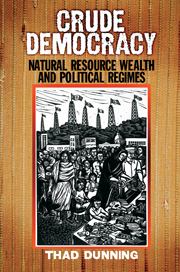Book contents
- Frontmatter
- Contents
- List of Figures
- List of Tables
- Preface and Acknowledgments
- Crude Democracy: Natural Resource Wealth and Political Regimes Cambridge
- 1 DOES OIL PROMOTE DEMOCRACY?
- 2 THE FOUNDATIONS OF RENTIER STATES
- 3 RESOURCE RENTS AND THE POLITICAL REGIME
- 4 STATISTICAL TESTS ON RENTS AND THE REGIME
- 5 THE DEMOCRATIC EFFECT OF RENTS
- 6 RENTIER DEMOCRACY IN COMPARATIVE PERSPECTIVE
- 7 THEORETICAL EXTENSIONS
- 8 CONCLUSION: WHITHER THE RESOURCE CURSE?
- Appendix: Construction of the Simulations
- Bibliography
- Index
4 - STATISTICAL TESTS ON RENTS AND THE REGIME
Published online by Cambridge University Press: 17 July 2009
- Frontmatter
- Contents
- List of Figures
- List of Tables
- Preface and Acknowledgments
- Crude Democracy: Natural Resource Wealth and Political Regimes Cambridge
- 1 DOES OIL PROMOTE DEMOCRACY?
- 2 THE FOUNDATIONS OF RENTIER STATES
- 3 RESOURCE RENTS AND THE POLITICAL REGIME
- 4 STATISTICAL TESTS ON RENTS AND THE REGIME
- 5 THE DEMOCRATIC EFFECT OF RENTS
- 6 RENTIER DEMOCRACY IN COMPARATIVE PERSPECTIVE
- 7 THEORETICAL EXTENSIONS
- 8 CONCLUSION: WHITHER THE RESOURCE CURSE?
- Appendix: Construction of the Simulations
- Bibliography
- Index
Summary
Do oil and other natural resources promote democracy? The compelling evidence presented in recent cross-national quantitative studies suggests not (Boix 2003; Jensen and Wantchekon 2004; Ross 2001). The positive and apparently robust empirical association between natural-resource wealth (actually, as I emphasize below, resource dependence) and authoritarianism, documented by previous studies, may seem to falsify the claim that oil or natural resources can have a democratizing effect. It is therefore crucial to evaluate the theoretical claims advanced in this study through analysis of the available cross-national data. I turn in this chapter to this task.
Recall that the theoretical analysis developed in Chapter Three and elsewhere does not contradict the idea that natural resource wealth may promote authoritarianism. Instead, the thesis advanced in this book is that natural resource wealth can have both authoritarian and democratic effects: resources have a conditional impact on the political regime. According to the theory, greater private inequality and lower resource dependence (i.e., greater development of non-resource sectors of the economy, given the level of resource rents) should tend to promote the democratic effect of resource rents, at the expense of the authoritarian effect. These are, of course, ceteris paribus claims; though the theoretical model of Chapter Three is deterministic, the world may not be. If the thesis is correct, however, we should be able to detect such a conditional effect of resource rents in time-series cross-section data.
- Type
- Chapter
- Information
- Crude DemocracyNatural Resource Wealth and Political Regimes, pp. 107 - 147Publisher: Cambridge University PressPrint publication year: 2008

